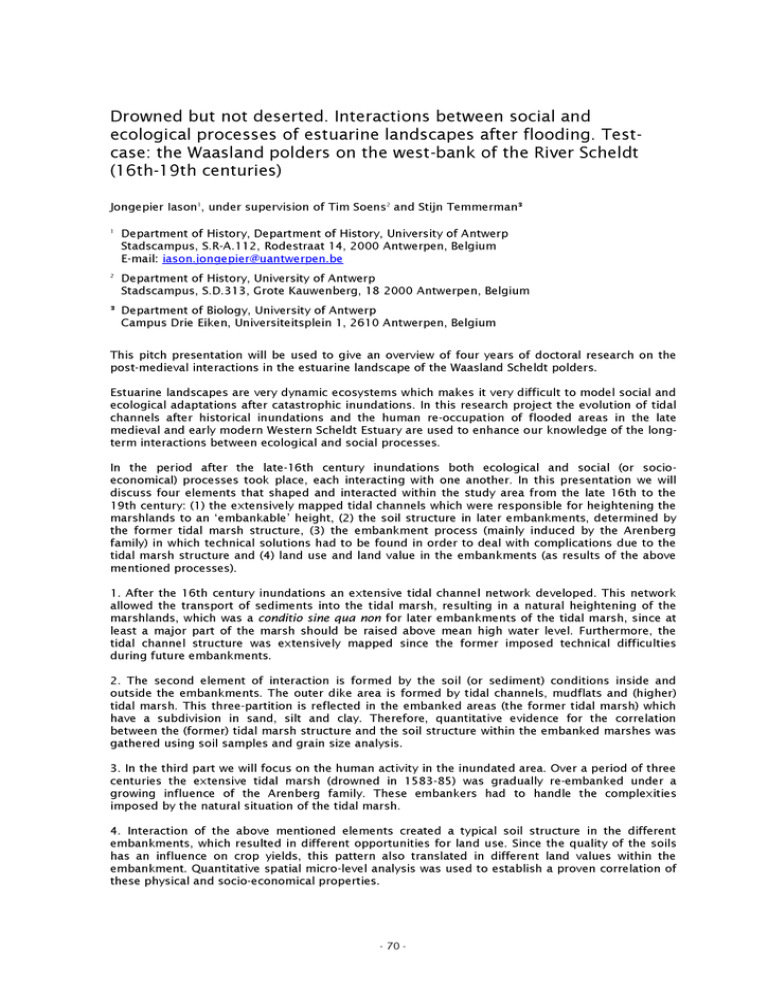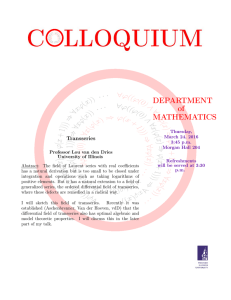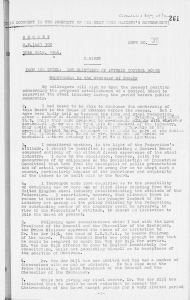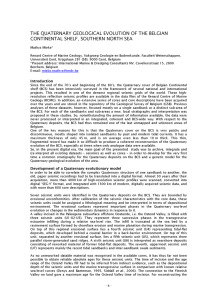Drowned but not deserted. Interactions ... ecological processes o f estuarine landscapes ...
advertisement

Drowned but not deserted. Interactions between social and ecological processes o f estuarine landscapes after flooding. T est­ case: the Waasland polders on the w est-bank o f the River Scheldt (1 6 th -l 9th centuries) Jongepier lason1, under supervision o f Tim Soens2 and Stijn Tem m erm an3 1 D epartm ent o f History, D epartm ent o f History, U niversity o f A ntw erp Stadscampus, S.R-A.112, Rodestraat 14, 2000 Antw erpen, Belgium E-mail: iason.ionqepier@ uantwerpen.be 2 D epartm ent o f History, U niversity o f A ntw erp Stadscampus, S.D.31 B, Grote Kauwenberg, 18 2000 Antw erpen, Belgium 3 D epartm ent o f Biology, U niversity o f A ntw erp Campus Drie Eiken, U niversiteitsplein 1, 2610 A ntw erpen, Belgium This pitch presentation w ill be used to give an overview o f fo u r years o f doctoral research on the post-m edieval interactions in the estuarine landscape o f the Waasland Scheldt polders. Estuarine landscapes are very dynam ic ecosystems which makes it very d iffic u lt to m odel social and ecological adaptations after catastrophic inundations. In th is research project the evolution o f tid al channels a fte r historical inundations and the human re-occupation o f flooded areas in the late medieval and early modern Western Scheldt Estuary are used to enhance o u r knowledge o f the lon g ­ term interactions between ecological and social processes. In the period a fte r the late-16th century inundations both ecological and social (or socioeconom ical) processes to o k place, each interacting w ith one another. In th is presentation we w ill discuss fo u r elem ents th a t shaped and interacted w ith in the study area fro m the late 16th to the 19th century: (1) the extensively mapped tid al channels which were responsible fo r heightening the m arshlands to an ‘em bankable’ height, (2) the soil structure in later em bankm ents, determ ined by the fo rm e r tid al marsh structure, (B) the em bankm ent process (m ainly induced by the Arenberg fam ily) in which technical solutions had to be found in order to deal w ith com plications due to the tid al marsh structure and (4) land use and land value in the em bankm ents (as results o f the above m entioned processes). 1. A fte r the 16th century inundations an extensive tid al channel netw ork developed. This netw ork allowed the tra n sp o rt o f sedim ents into the tid a l marsh, resulting in a natural heightening o f the marshlands, which was a conditio sine qua non fo r later em bankm ents o f the tid al marsh, since at least a m ajor part o f the marsh should be raised above mean high w ater level. Furtherm ore, the tid al channel structure was extensively mapped since the fo rm e r imposed technical d iffic u ltie s during fu tu re em bankm ents. 2. The second elem ent o f interaction is form ed by the soil (or sedim ent) co nd itio ns inside and outside the em bankm ents. The outer dike area is form ed by tid al channels, m udflats and (higher) tid al marsh. This th re e-p artition is reflected in the embanked areas (the fo rm e r tid al marsh) which have a subdivision in sand, silt and clay. Therefore, q uantitative evidence fo r the correlation between the (form er) tid al marsh structure and the soil structure w ithin the embanked marshes was gathered using soil samples and grain size analysis. 3. In the th ird part we w ill focus on the human activity in the inundated area. Over a period o f three centuries the extensive tid al marsh (drowned in 1 583-85) was gradually re-em banked under a grow ing influence o f the Arenberg fam ily. These embankers had to handle the com plexities imposed by the natural situation o f the tid al marsh. 4. Interaction o f the above m entioned elem ents created a typical soil structure in the d iffe re n t em bankm ents, which resulted in d iffe re n t o p p o rtu n itie s fo r land use. Since the q u a lity o f the soils has an influence on crop yields, th is pattern also translated in d iffe re n t land values w ithin the em bankm ent. Q uantitative spatial m icro-level analysis was used to establish a proven correlation o f these physical and socio-econom ical properties. - 70 - References Allen J.R.L. 1 992. Large-scale te xtu ra l patterns and sedim entary processes on tid a l salt marshes in the Severn Estuary, southw est Britain. Sedim entary Geology 8 1 :2 9 9 -3 1 8. De Kraker A.M.J. 2007. De o ntw ikke lin g van het landschap. In: Wilssens, M. (Ed.) Singelberg: het kasteel en het land van Beveren. Tielt, Lannoo. Guns P. 2008. H istorische evolutie van het polderlandschap langs de linke r Scheldeoever. Heruitgave editie 1973. Borgerhout, W aterbouw kundig Laboratorium . Jongepier I., T. Soens and S; Tem m erm an. 2012. Poldercartografie. De rol van kaarten bij bedijkingen en landschapstransform atie. In: Ooghe B., C. Goossens and Y. Segers,. (Eds) Van brouck to t dyckagie. V ijf eeuwen Wase polders. Sint-Niklaas, Abim o. Masure H., I. Jongepier, T. Soens, R. Vermoesen and E. Wauters,. 201 2. Landschaps- en bew oningsevolutie van de O ud-Arenbergpolder, 17e-19e eeuw. T ijd -sch rift. Heemkunde en loka al-erfg oe dp raktijk in Vlaanderen 2:34-49. Mijs M. 1 973. De landschapsgeschiedenis van de scheldepolders ten noorden van Antw erpen: bijdrage to t de historische geografie van de scheldepolders. Belgische vereniging voor aardrijkskundige studies 42:39-1 24. Priester P.R. 1 998. Geschiedenis van de Zeeuwse landbouw circa 1600-1 910. W ageningen, Landbouw universiteit. Soens T., P. De Graef, H. Masure ,and I. Jongepier. 2012. Boerenrepubliek in een h eerlijk landschap? Een nieuwe kijk op de Wase polders ais landschap en bestuur. In: Ooghe B., C. Goossens and Y. Segers (Eds). Van brouck to t dyckagie. V ijf eeuwen Wase polders. Sint-Niklaas, Abim o. Tem m erm an S., G. Govers, P. Meire and S. Wartel. 2003. M odelling long-term tid a l marsh grow th under changing tid a l co nd itio ns and suspended sedim ent concentrations, Scheldt estuary, Belgium. Marine Geology 193:151-169. Van C ruyningen P. 2000. Behoudend maar buigzaam : boeren in West-Zeeuws-Vlaanderen, 16501 850. W ageningen, U niversiteit van W ageningen, A fdeling Agrarische Geschiedenis. Van C ruyningen P. 2006. Profits and risks in drainage projects in Staats-Vlaanderen, c. 1590-1665. Jaarboek voor Ecologische Geschiedenis 2 0 0 5 /2 0 0 6 : 1 23-142. Van Gerven R. 1 977. De Scheldepolders van de Linkeroever (Land van Waas en Land van Beveren): bijdrage to t de geschiedenis van natuur, land, volk. Beveren. W olters M.J. 1869. Recueil de lois, arrêtés, règlem ents etc., concernant l'a dm inistratio n des eaux et polders de la Flandre orientale. Gent, Hoste. W oodroffe C.D. 2003. Coasts: Form, Process and Evolution. C am bridge, C am bridge U niversity Press. - 71 -



